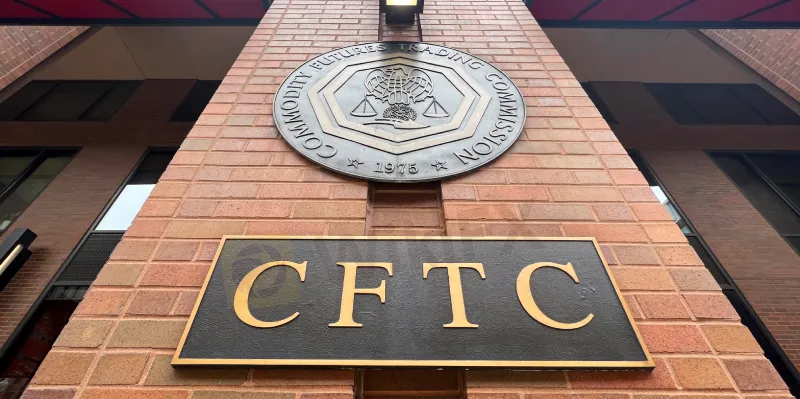简体中文
繁體中文
English
Pусский
日本語
ภาษาไทย
Tiếng Việt
Bahasa Indonesia
Español
हिन्दी
Filippiiniläinen
Français
Deutsch
Português
Türkçe
한국어
العربية
CFTC Charges Four Unregistered Binary Options Firms in US
Abstract:CFTC charges four unregistered binary options firms, alleging false claims of regulation in the U.S. The enforcement action targets platforms dealing in crypto and derivatives.

The Commodity Futures Trading Commission (CFTC) has filed a lawsuit against four binary options businesses, accusing them of operating as unregistered futures commission merchants (FCMs) while fraudulently claiming to be licensed. This action is part of the CFTC's continuous endeavor to safeguard investors against unregulated companies in the cryptocurrency and derivatives markets. Cryptoiminerstrade.com, Expert Stocks Zone, FalconForexBot, and swiftminingexpert.com are accused of offering binary options on commodities such as foreign currencies and cryptocurrencies such as Bitcoin while failing to comply with regulatory requirements.
CFTC Charges Four Unregistered Binary Options Firms
In a substantial enforcement action, the CFTC accuses these four sites of failing to register as futures commission merchants (FCMs). According to the CFTC's allegations, the companies in issue posed as genuine trading platforms capable of handling client assets while being regulated by the Commission. However, they apparently lacked the necessary registrations to lawfully operate in the United States.
These organizations, claiming to be situated in New York, Los Angeles, and Beaumont, Texas, provided binary options on commodities and cryptocurrency. The CFTC contends that these platforms misrepresented their regulatory status and put investors in danger by operating without control.
Binary Options Firms Under Investigation
The CFTC's targets in this lawsuit include cryptoiminerstrade.com, Expert Stocks Zone, FalconForexBot, and swiftminingexpert.com. All four platforms have been accused of breaching the Commodity Exchange Act by failing to register as FCMs, which is a necessary requirement for enterprises that deal with futures contracts and client money.
- Cryptoiminerstrade.com: Claiming to operate from New York and Los Angeles, this platform marketed itself as the largest supplier of binary options and Forex trading in the United States. It fraudulently claimed to be CFTC-regulated and touted its competence to handle clients' assets.
- Expert Stocks Zone: Located in New York, this website provided binary options on both commodities and cryptocurrency. According to the CFTC, the platform overemphasized client fund security and gave itself awards for meeting regulatory criteria.
- FalconForexBot: Based in New York and Beaumont, Texas, this platform claimed to be the best alternative for binary options, Forex, and cryptocurrency trading. It reportedly deceived investors by misleading statements about regulatory control and highlighting the security of client funds.
- Swiftminingexpert.com: Allegedly situated in New York and Los Angeles, this platform followed a similar path, falsely claiming to be CFTC-regulated and capable of handling client money in the US binary options market.
These platforms misled investors into believing they were regulated, giving a false feeling of security. The CFTC is now seeking cease-and-desist orders to prevent additional breaches and safeguard prospective investors from unregistered and deceptive platforms.
CFTC's Broader Enforcement Sweep
This enforcement action is part of the CFTC's wider push to clamp down on unregistered FCMs and unregulated businesses in the cryptocurrency and derivatives markets. The Commission has regularly recommended investors confirm the registration of any platform that provides financial products such as binary options or cryptocurrency trading.

The rising popularity of cryptocurrencies and derivatives trading has spurred the CFTC to enhance its surveillance and act against companies outside the legal framework. By pursuing these unregistered businesses, the CFTC hopes to protect investors from the enormous dangers of enterprises operating without regulatory oversight.
SEC v. Jarkesy Case Brings Up Questions
The allegations filed against the four unregistered entities have ignited a legal discussion inside the CFTC. Commissioner Summer K. Mersinger made a dissenting statement, citing concern about how the CFTC handled the complaints. Mersinger said that there was insufficient evidence to support the argument that these businesses behaved as FCMs, citing a lack of proof that these firms took money or property to facilitate deals.
Mersinger's dissent emphasized the recent Supreme Court decision in SEC v. Jarkesy, which increased the amount of scrutiny federal agencies face when seeking enforcement via administrative processes. The court stressed the need for detailed evidence in situations involving unlicensed FCMs, and Mersinger questioned whether the accusations in these cases reached this level.
Despite her reservations, the CFTC will continue with the enforcement measures under its administrative procedures, while Mersinger's dissent indicates that possible judicial challenges may emerge in the future. Her remark emphasizes the need to present convincing evidence when charging corporations that function as unregistered FCMs.
The Ongoing Crackdown on Unregistered Entities
The CFTC's continuous assault on unregistered FCMs underscores its larger commitment to enforce regulatory standards in the rapidly growing cryptocurrency and derivatives markets. The emergence of cryptocurrencies such as Bitcoin, as well as the rising interest in binary options, have provided an opportunity for unregulated enterprises to abuse naive investors. The CFTC is committed to preventing these companies from deceiving the public and exposing investors to needless risks.
To that end, the CFTC advises investors to use the National Futures Association's BASIC system to check the registration of any business with which they want to invest. This phase is critical in ensuring that money is only sent to companies that meet regulatory criteria.
Protect Your Investments
Investors should be cautious when dealing with binary options platforms and cryptocurrency trading organizations, particularly those that claim to be licensed but lack sufficient documents. The CFTC's most recent enforcement proceedings remind investors of the necessity of checking a firm's registration status before committing any cash.
Visit the WikiFX News page for further information on the most recent regulatory changes and enforcement proceedings.

Disclaimer:
The views in this article only represent the author's personal views, and do not constitute investment advice on this platform. This platform does not guarantee the accuracy, completeness and timeliness of the information in the article, and will not be liable for any loss caused by the use of or reliance on the information in the article.
Read more

What would happen if Harris and Trump tie in the Electoral College?
As the 2024 U.S. presidential race approaches, investors worldwide are closely watching potential outcomes and their implications for global markets. While a 269-269 Electoral College tie between Vice President Kamala Harris and former President Donald Trump remains unlikely, its occurrence would set the stage for an unprecedented period of political uncertainty, triggering a contingent election decided by Congress. Such uncertainty would ripple across forex, stock, and oil markets, where stability and predictability are prized. Here’s a look at how a tie could affect these key financial sectors.

Social Media Investment Scam Wipes Out RM450k Savings
A former finance officer in Malaysia lost RM450,000 in savings after being deceived by an investment scheme advertised on social media.

Malaysian Woman's RM80,000 Investment Dream Turns into a Nightmare
A 50-year-old Malaysian woman experienced a devastating loss exceeding RM80,000 after falling victim to an online investment scam that preyed on her aspirations for substantial returns. The victim, a former secretary at a private firm, had initially hoped to secure a profitable investment opportunity but instead found herself deceived by a fraudulent scheme.

CMC Markets and ASB Bank Form Strategic Partnership
CMC Markets partners with ASB Bank to offer NZ clients advanced trading technology, access to global markets, and enhanced investment tools on ASB's digital platforms.
WikiFX Broker
Latest News
How Sentiment Analysis Powers Winning Forex Trades in 2024
Capital One Faces Potential CFPB Action Over Savings Account Disclosures
Malaysian Woman's RM80,000 Investment Dream Turns into a Nightmare
Social Media Investment Scam Wipes Out RM450k Savings
FP Markets Received Three Major Awards
Can Blockchain Technology Protect Your Money from Risk?
How can the forex fix be manipulated?
CMC Markets and ASB Bank Form Strategic Partnership
FX SmartBull Review! Read first, then Invest
Bangladesh steps up payments to Adani Power to avoid supply cut
Currency Calculator


